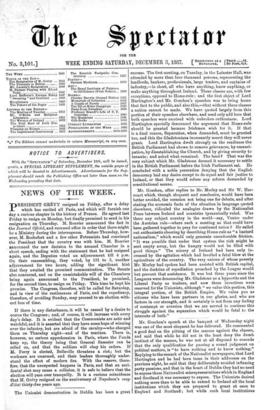Mr. Goschen, after replies to Mr. Morley and Sir W.
Har- court which, though eloquent and conclusive, would have been better avoided, the occasion not being one for debate, and after stating the economic facts of the situation in language quoted elsewhere, ridiculed the analogies drawn by the Nationalist Press between Ireland and countries tyrannically ruled. Was there any subject country in the world—say, Venice under the Austrian rule—where such a meeting as that could have been gathered together to pray for continued union P He called out enthusiastic cheering by describing Home.role as "a bastard nationalism," which would only generate unendurable friction. "It was possible that under that system the rich might be sent empty away, but the hungry would not be filled with good things." The misery of Ireland had been only in- creased by the agitation which had levelled a fatal blow at the agriculture of the country. The very unions of whose poverty Mr. Morley had spoken had been assisted with British capital, and the doctrine of repudiation preached by the League would but prevent that assistance. It was but three years since the Leaguers were denouncing Mr. Gladstone as a hypocrite and the Liberal Party as traitors, and now these invectives were reserved for the Unionists, although "we value this portion, this integral portion, of the British Empire. We value you as citizens who have been partners in our glories, and who are factors in our strength, and it certainly is not from any feeling of contempt or aversion that we are nerved to continue this struggle against the separation which would be fatal to the interests of both."









































